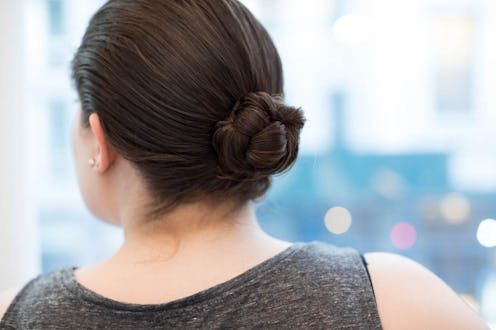Life
How 3 Autistic Women Dealt With Delayed Diagnosis — And The Sexism They Faced Along The Way

It wasn't until four years ago, when Maria was 24, that she was finally diagnosed as autistic, as her little brother was when they were kids. Though Maria, a healthcare advocate whose name has been changed to protect her privacy, tells Bustle that she and her brother were "very similar" and only a year apart in age, her brother is "nonverbal, and has other symptoms" that are more easily recognized as signs of autism. It took two decades for doctors to recognize that Maria was also on the autism spectrum. But unfortunately, her experience is not unique: Autism, or autistic spectrum disorder (ASD), has long been thought of as a disorder that almost exclusively affects men and boys — leading to autism being underdiagnosed in women and nonbinary people.
“Because autistic research largely centers on boys, health care providers can be uninformed, and unprepared for the reality of the ‘atypical’ autistic girls," Stacy Stanford, a healthcare policy analyst and researcher, tells Bustle. "This can lead to doctors and therapists searching for other labels, scoffing at the idea of an autism diagnosis, and instead attempting to diagnose and treat OCD, personality disorders, [or] other inaccurate psychiatric labels.”
Though the CDC estimates that only one girl is diagnosed with autism for every four boys, research is beginning to suggest that this disparity is due in part to gender bias that assumes autism doesn't affect women. Furthermore, research suggests that autistic women tend to display slightly different traits than their male counterparts. For instance, Healthline reported that autistic women are more likely to “camouflage” (aka, mask their symptoms) compared to men with autism. What’s more, a 2014 study revealed that autistic women are also more likely to experience significant emotional issues, difficulty adapting to social situations, and to exhibit “external” behavioral issues. Because of these differences in symptoms between genders, which are incredibly understudied, many healthcare professionals can miss the early signs of autism in women, leading to misdiagnosis and a delay in treatment.
In fact, it’s not uncommon for autistic women to be misdiagnosed with mental illness, rather than autism; the disorder can manifest for some as self-harm behaviors, obsessive-compulsive behaviors, suicidal ideation, and otherwise apparent emotional dysregulation. “I didn't know that I was also autistic until I was in an eating disorder treatment center as an adult," Maria says. There, she learned that anorexia and disordered eating can be manifestations of autism. "I was diagnosed with anorexia long before autism,” she says.
Kat, a 24-year-old college student who is both autistic and diagnosed with co-occurring mental illnesses, says she feels as though autistic women like herself are treated differently than autistic men are when it comes to seeking medical help. “Women are often treated as though we’re overreacting, and it’s often blamed on our ‘periods’ when we get emotional, or worked up over things, as opposed to men who are the ‘stronger sex’ by society’s standards,” she says.
“Mentally ill, queer, autistic women of color will experience layers of oppression related to race and sexuality, on top of stigma."
This medical gender bias is common across a number of diagnoses; as Marie Claire reported in 2017, female bodies are often not included in medical research, meaning that doctors are looking for men's symptoms when they might present completely differently. Furthermore, numerous studies show that women's pain is consistently taken less seriously by doctors. For autistic women, their disorder, subject to its own gender bias, can compound this disparity.
“In my own research, and in reviewing existing studies, it is apparent that autistic women with other intersecting identities face the greatest barriers in health care access,” says Stanford. “Mentally ill, queer, autistic women of color will experience layers of oppression related to race and sexuality, on top of stigma, and other issues connected to gender and disability.”
But the sexism autistic women face can extend beyond the doctor's office, and impact the way they're treated in other areas of life. Kat explains that she’s had academic advisors call her “lazy,” and refer to her disorders as an “excuse” to not finish work on time. As The Independent reported in April, thousands of autistic girls and women do not receive additional support throughout their schools, because of the false belief that autism is a disorder that only affects men.
The sexist myths that stigmatize autistic women and nonbinary people are not only exacerbated in the healthcare system and academia, but by our society’s ideas of gender norms. “I wish people understood the ways in which autistic non-men are socially bullied, and pressured into maintaining an allistic persona compared to autistic men. Non-men aren’t allowed to be different from the norm in a society that commodifies the experience of a non-man, over that non-man’s autonomy and right to exist,” says Becca, 30, a mental health advocate who was correctly diagnosed as autistic just this past year, despite being regularly involved in mental health treatment since she was 13 years old.
“I was groomed into masking from an early age and instead of wondering why I was in need of so much social correction, my peers and adults bullied me into changing behaviors like stimming, meltdowns, and not being able to maintain eye contact,” she tells Bustle. “Instead of wondering how to accommodate me, they force molded me into who made them comfortable.”
Autism in women, girls, and nonbinary people may be less recognized than it is in a majority of autistic men and boys, but early intervention and diagnosis could dramatically improve the quality of life for autistic women. These women's stories underscore the broader issue of gender bias in autism diagnoses. Becca says that, in the end, "the system fails non-men so hard."